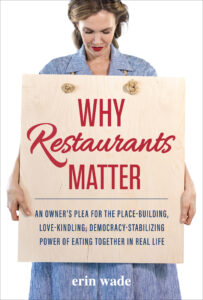The New Mexico State Legislature has sent to the governor a bill that would raise the minimum wage over coming years and progressively increase the tipped minimum for employees like waiters and bartenders to 25 percent of the full minimum wage.
The goals are to reduce income inequality, restore the “value” of work and provide support for lower-wage workers, many of them women, who are raising families on a single paycheck.
Those are worthy aims: I support them. And in an industrial society, like the United States of not-so-long-ago, raising the minimum wage would make sense.
But we live in a post-industrial America, and for restaurants – like the ones I run in Santa Fe and Albuquerque – this proposed legislation threatens a cascade of unintended consequences, many of them bad for the same people lawmakers set out to help.
Because we derive our value from physical labor, a typical restaurant employs roughly 10 times more humans per dollar of revenue than Google or Facebook or Amazon. Unlike Amazon, restaurants are experiencing a period of stagnant sales coupled with increasing costs.
In other words, we are suffering from the same kitchen-table anxiety as most American households struggling to make ends meet.
The market for cooks and servers and bartenders is already tight as a drum and doing a pretty good job on its own of pushing wages up. In an industry with razor-thin margins and frequent failures, there is no way to bear an increase in costs like the kind the bill would produce without a concomitant increase in menu prices.
Because Americans spend, on average, close to half of their food dollars on eating out, much of any increase in pay to workers would be quickly absorbed in terms of higher living expenses for their customers. If those-same customers opted to eat out less, sales will decline. Small, locally owned mom-and-pop shops would be hit the hardest, and many might have to shut down or lay people off.
Restaurant owners aren’t profit-obsessed demons; we are just trying to make payroll. When labor costs creep up towards or over 40 percent of sales, things get dicey. Ask any restaurant owner: Payroll is always the biggest cash hit, the thing that triggers an autonomic spell of acid reflux every other Friday.
Of course, restaurants could try to reduce payroll by investing in automation rather than people, which is what the rest of the world is busy doing. This happens in little ways we think of as progress that also chip away at paid labor – reservation software, online ordering, smart, programmed ovens like Turbochef that robo-cook food with the push of a button.
But substituting jobs for people with computerized gear and networks will only concentrate wealth in the winners who control this new virtual property and force more and more Americans out to the economic margins.
Most independent restaurant owners are part of the middle class – remember the once-robust income stratum that used to define America? Many restaurants’ net income is not far from what their best servers or bartenders make. Redistributing income from the middle class would only exacerbate the growing divide between the wealthy few and everyone else.
The problems we face with income inequality and creating an economy that creates more and better jobs is unprecedented. It requires equally innovative solutions. The proposed minimum wage hike is just a hammer in a world with fewer and fewer nails.

